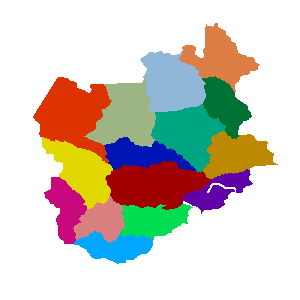Kowk-Avki
This article is incomplete because it is pending further input from participants, or it is a work-in-progress by one author. Please comment on this article's talk page to share your input, comments and questions. Note: To contribute to this article, you may need to seek help from the author(s) of this page. |
Confederation of Kowk-Avki | |
|---|---|
| Motto: "Sayohatchi vafot etadi, lekin oila tirik qoladi." "The traveler dies, but the family survives." | |
| Anthem: "Oh, Great Unity" | |
| Capital | Boshlan |
| Official languages | Kowk-Avki, Altgöl |
| Recognised national languages | Nafrasi, Kīmāk |
| Demonym(s) | Kowk-Avkian |
| Government | Tribal Oligarchic Confederation |
Kowk-Avki is a primarily rural nation in Catai, which consists of differenting clans in a confederation. The nation exists on the western border of Transcandar and Ozena.
Etymology
The term Kowk-Avki was originally used by clans who claimed ancestry to the union of Kowk and Avki. It was not until 1925 when the term was used to describe a nation of Kowk-Avki. Akmi 'the Prodigy' is the first recorded person to used the term in that manner.
Politics
Clans
| Name | Leader | Population | Color | Faction |
|---|---|---|---|---|
| Oybek | Mansur II | TDB | IIIIIIIIII | ZAMO |
| Ayginina | TDB | TDB | IIIIIIIIII | ZAMO |
| Savdogar | TDB | TDB | IIIIIIIIII | ZAMO |
| Otfo'hisha | TDB | TDB | IIIIIIIIII | U.H. |
| Jadstoof | TDB | TDB | IIIIIIIIII | ZAMO |
| G'arblilar | TDB | TDB | IIIIIIIIII | ZAMO |
| Ona'kelmaq | TDB | TDB | IIIIIIIIII | S.M.S |
| Suv'klilik | TDB | TDB | IIIIIIIIII | OZOZ |
| Derya | TDB | TDB | IIIIIIIIII | U.H. |
| Bo'arl | TDB | TDB | IIIIIIIIII | OZOZ |
| Koolmk | TDB | TDB | IIIIIIIIII | ZAMO |
| Itimgen | TDB | TDB | IIIIIIIIII | S.M.S |
| Orazkeldi | TDB | TDB | IIIIIIIIII | ZAMO |
| Ișekei | TDB | TDB | IIIIIIIIII | S.M.S |
| Uzun | TDB | TDB | IIIIIIIIII | U.H. |
History
Period of Isolation
In the late 8th century the clans of Kowk-Avki held a culture of isolationism which did not end until the year 941. Due to the low population of Kowk-Avkians and the little resources that the land could provide, neighboring powers saw no benefit in invading. As agriculture became more common in various clans the population grew and trade increased between the clans. [Disease] eventually spread uncontrollably, many people emigrated from their clans to escpae the disease.


